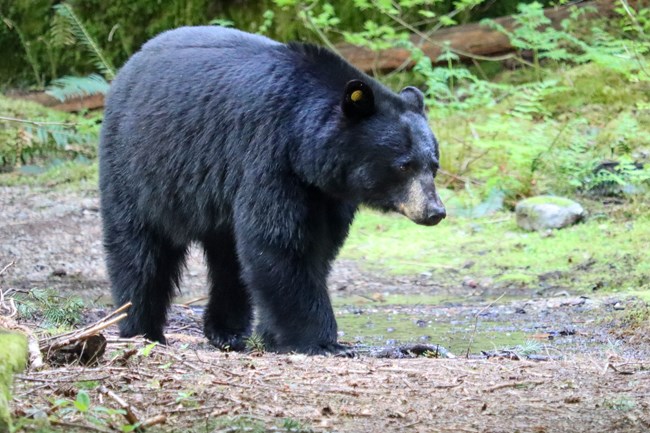Last updated: September 5, 2022
Article
Black Bear 380

Ⓒ Ben Zarante
Black Bear 380 had to be euthanized July 2022. He may be remembered from the previous summer. He was captured, tagged, and aversively conditioned in Colonial Creek Campground in 2021, which resulted in a positive outcome for the rest of the year. Unfortunately, a chain of opportunities during the summer of 2022 allowed Bear 380 to get food from visitors repeatedly. He lost his fear of people and was more and more difficult to chase from the campground. Since our frontcountry campgrounds are experiencing exceptionally high amounts of visitation, a food-conditioned bear can quickly become dangerous.
This is a tough situation for all NPS staff, and especially for our staff that patrol the campgrounds 7 days a week, specifically helping visitors understand how important it is to store food securely. The fact is that while 99% of visitors may do things right, the other 1% can still provide the kinds of opportunities that lead to Bear 380 going down a bad path.
Over the last decade the park has seen a significant increase in visitor use, which increases the opportunities for food rewards: every small bit of dropped trail mix or dinner left out in camp can add up to a bear fatality. When black bears keep getting their behaviors rewarded by people leaving food out, aversive conditioning tools become ineffective. Essentially the reward outweighs the noise and other deterrents we use to equate people with being a bad thing in the bear's mind. Once a bear passes that threshold, human safety also becomes compromised. In 2021, Bear 380 received a food reward and was aversively conditioned. In 2022, Bear 380 received numerous food rewards and additional aversive conditioning was ineffective.
Generally, translocation of bears is not successful and has proven to be ineffective, while causing undo stress on the bear. Bears travel a long way - over mountain ranges and other obstacles - to return to the place where they know rewards await. At best, translocation of a food-conditioned bear buys days or weeks of time until a bear returns to the place it started. At worst, the bear continues its conflict behavior at other locations where people are not expecting it, as it works its way back to the original site.
The food reward drive is an incredibly powerful psychological mechanism. This is why we do everything possible to re-train a bear when it gets food for the first time. After even 2 or 3 reward events, it becomes very difficult to override. We also work hard to re-train people! It is especially challenging in front country campgrounds which can have upwards of 400+ people a night. We as humans need to change our behavior to prevent animals from receiving food rewards. Closing the campground might discourage the bear temporarily, but it would likely return as soon as the campground reopened.
Park staff attempted to find a home for Bear 380 in an Association of Zoos and Aquariums-approved sanctuary with high animal welfare standards. There were no vacancies. Unfortunately, zoos and sanctuaries within a reasonable travel distance had as many black bears as they could handle.
The park will continue to educate visitors on the importance of keeping bears wild. Storing food properly is the key to keeping bears safe. It is up to us when visiting public lands, park trails, and campgrounds, to do our part and store food properly.
The park is working on updating our wildlife conflict plan, mobilizing staff to help patrol campgrounds in the evenings when bears are around, and continuing to build our relationship with Washington Department of Fish and Wildlife's amazing bear dogs. We are also exploring how to incorporate Bear 380 into the bear trailer exhibits so his story can help visitors understand the importance of keeping bears wild, as well as exploring ideas to educate visitors with the solemn reminder that a fed bear is a dead bear.
